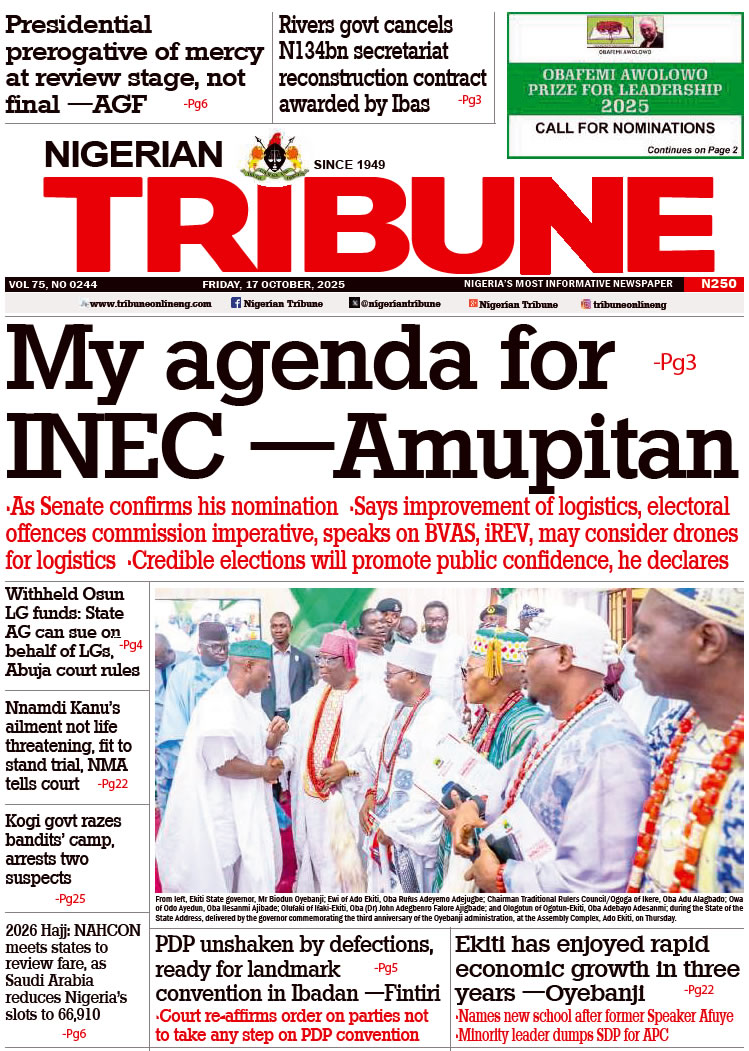I had the distinct privilege of delivering convocation lectures at two private universities (University of Mkar, Benue State, and Chrisland University, Abeokuta) this October. These engagements provided me with a unique opportunity to interact with various stakeholders, including the students, esteemed faculty members, the institutional council, and the distinguished board of directors.
These visits served to reaffirm the pivotal role that private universities play in the ongoing process of educational reform in Nigeria. Of course, I cannot pretend not to know the various criticisms and shortcomings.
A solid education sector is a staple of any developed nation, and for us as a developing nation, it is a pressing need. While our education at the primary and secondary levels is far from perfect, education at the tertiary level in Nigeria faces more peculiar challenges. In recent years, we have witnessed the rise of several privatized tertiary education providers working in an attempt to tackle these challenges. This rise, however, has not been without heated public discourse, with millions of Nigerians on either side. One side sees no merit in the education provided by private universities, while others believe they are very needed in the context of Nigeria’s higher education sector today.
The arguments against them are not many, but they deeply resonate with those who believe in them. The most notable criticisms against public schools centre on the high cost of school fees, quality of learning, and the equipping or preparedness that private schools give their students for life after school or “the real world”. More elaborately, many Nigerians argue that the level of school fees typically associated with these schools is unreasonable and unrealistic in the Nigerian context, insisting that they are purely profit-driven. Another small subset of Nigerians insists that the quality of the curricula in private universities pale in comparison to government-funded universities.
The last but the most common argument asserts that private universities do not prepare their students for the real world. Owing to unproven allegations that private university lecturers are not as demanding, or processes are a lot more straightforward, or evidenced by the occasionally seemingly unusual high number of first-class graduates they produce, most Nigerians conclude that private universities are inferior to their government-funded counterparts. It is alarming to have many first-class in many of these private universities.
But do these arguments really hold water? Does the fact that they produce more first-class graduates than public universities mean they are not good enough, or perhaps it just means they grade students more fairly? And for all the structure, ease, and advanced organization that comes with a private university education, are not the school fees, although costly, a little justified? Perhaps all these are not even the right questions to ask. To those who are public education activists, the most important question I would like to ask is, can the Nigerian educational sector even sustainably survive without private education?
Let’s start with a little tour through history. As of 1999, there were only three private universities in Nigeria: Igbenidion University in Edo state, Madonna University in Anambra, and Babcock in Ogun state. By 2020, that number had risen to 79. You don’t get that kind of surge in private universities unless there is demand for it. And that’s the point: demand. The demand for private higher education shows that there are deeply worrying flaws or challenges plaguing the public education sector. Challenges that the government has failed to address after several years. It is on this basis that the need for private universities can be safely established.
Starting with the most obvious challenge: Strike Actions. Strike actions by Nigerian public universities academic and non-academic members of staff are so endemic that jokes about the Academic Staff Union of Universities (ASUU) striking more than thunder are very rife amongst the populace. The most recent strike in 2020 lasted for about 10 months. 10 months! With incessant strike actions like this unpredictably but regularly punctuating the school calendar, it would be near impossible, even miraculous, for any students in a public university in Nigeria to graduate according to the normal duration of their courses of study.
What makes this occurrence so unfortunate is the fact that although strikes occur solely because of a struggle between the university staff and the government, the biggest victims are always the innocent students. These delays can cause students to graduate as much as 3 years later than they were originally intended to. Of course, the duty is of the government and relevant authorities to provide and satisfy the feasible needs of the staff, but when we argue from the angle of the students, would it be too much to provide more options for those that can afford them?
With unreasonable delays like this affecting the lives of students, it would be irresponsible to suggest that Nigeria’s education sector does not need alternative options. With a private university education, you are guaranteed to graduate at the time you ought to. And that is a reasonable step in the right direction. Imagine that we had no private universities in Nigeria. That would mean that during that 10-month strike period, absolutely no student in higher education in Nigeria would have gone to school for almost a full year! That would be almost one full year pointlessly wiped away from millions of Nigerian youth! And we all know the repercussion of an idle hand of agitated and energetic people; it’d been a wildfire.
Also, the issue of inadequate funding that plagues public universities is not to be understated. Since they are heavily dependent on government subsidies for their funding, the government’s failure to provide often ends up being the root cause of the endemic strike actions previously mentioned. This insufficiency of funding, of course, translates to poor or inadequate infrastructure for public universities. From the basic amenities like light and water for students to other necessary infrastructure for hands-on learning such as libraries, computer systems, laboratory equipment, and/or specimens, public universities often struggle to make provision for these at a scale sufficient for their number of students admitted. This detracts from the quality of education their students receive.
However, private universities are more commercialized and not dependent on government funding. This means that not only are they able to better provide the infrastructure required for their projects, but they can also create an environment with the proper ambiance to encourage learning. Their adequate resources allow them to build infrastructure to cater to a rich student experience, from research programs to student initiatives to extracurriculars.
Another pivotal argument for the need for private universities in Nigeria is the demand-supply gap for higher education in Nigeria. Over the past two decades, as Nigeria’s population has rapidly grown, the demand for tertiary education has grown rapidly as well. This demand has burgeoned so much that the existing public university infrastructure cannot meet it.
To illustrate, a study as far back as 2010 showed how, in the year before that, about 1,182,381 candidates sat for the University Tertiary Matriculation Exam (UTME), but all the existing universities would collectively be able to admit less than 200,000. In 2023, the number of candidates seeking admission into university has only risen. And public universities today are still plagued with shortages in infrastructure and personnel. The crisis here is that no matter how many qualified applicants the public universities absorb, there will still be a very large pool of qualified candidates left without admissions. For this reason alone, private universities are needed because they play a pivotal role in addressing the demand-supply gap in higher education. More so, there is no way the government would miraculously build enough schools with enough facilities within a short time to meet the demands.
Private universities are nowhere near perfect. However, there are several other strengths possessed by private university education that can be imitated by their government-funded counterparts for a stronger education system overall. Private universities in Nigeria are more efficient with their organization and processes; they also tend to possess more up-to-date curricula with an intentionality towards providing teaching from the finest lecturers, scholars, and professionals in the country.
However, their challenges, such as the high cost of school fees (which is an inevitable by-product of their dependency on school fees to finance their operations), will mean that for the foreseeable future, a private university education will still be off-limits to a majority of the Nigerian youth. And this is no fault of theirs but simply a product of economic realities. However, where the supply is more than the demand, the prices can be anticipated to go down in the face of good competition. More private schools mean more possibilities of more affordable prices. Many of the world-class universities in the world are not run by the government; this is watching out for inefficiency in political dependency.
Regardless, it is submitted that the rapid spread of private universities is a welcome development anywhere in the world. These institutions thanklessly satisfy a need that is crucial for national development. A need that clearly cannot be satisfied just by public universities. And since these institutions have different strengths, they must complement each other. The government must enable partnerships and better synergy between both private and public institutions, as this will achieve a better outcome for the Nigerian higher education scene as a whole. This is not to say that the government should disregard funding and continuous development of public education, as the poverty rate and accessibility to education in Nigeria will always make them important.
READ ALSO FROM NIGERIAN TRIBUNE
WATCH TOP VIDEOS FROM NIGERIAN TRIBUNE TV
- Relationship Hangout: Public vs Private Proposals – Which Truly Wins in Love?
- “No” Is a Complete Sentence: Why You Should Stop Feeling Guilty
- Relationship Hangout: Friendship Talk 2025 – How to Be a Good Friend & Big Questions on Friendship
- Police Overpower Armed Robbers in Ibadan After Fierce Struggle






